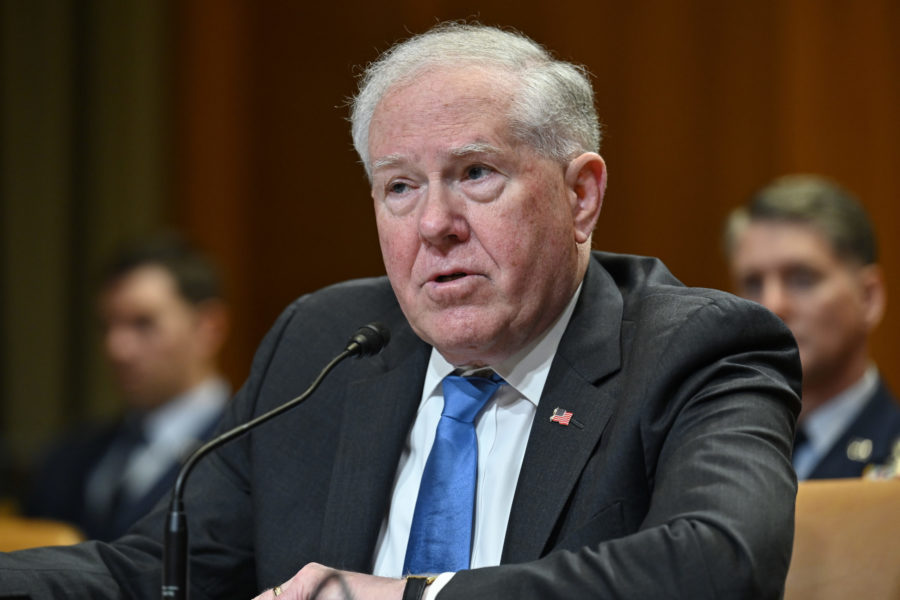The U.S. could find itself in a near-peer conflict with an adversary like China and Russia “tomorrow,” Air Force Secretary Frank Kendall said in a livestreamed Facebook event—and the department is “not as [ready] as we could be, by a significant margin.”
“I’ve spent a lot of the first two years in office worried about our modernization programs—what do we need to buy for the next generation of capability,” Kendall said during a “Coffee Talk” with Chief Master Sergeant of the Air Force JoAnne S. Bass. “We’ve been able to get a lot of that into our budget, but that’s not here yet.”
But, Kendall added, “The threat is here already. And so we’ve got to think about: Are we organized to deal with that threat? Are we training to deal with that threat? Are we prepared in terms of how we structure a lot of different functions within the Department of the Air Force, for both the Air Force and Space Force, so that we could deal with that threat? If we were asked tomorrow to go to war against a great power, either Russia or China, would we be really ready to do that? And I think the answer is not as much as we could be, by a significant margin. And we’ve got to start spending a lot of time thinking about that and figuring out what we’re going to do about it.”
Given his past as Pentagon’s acquisition czar, Kendall’s time as Secretary of the Air Force has often been defined by the systems the Air Force and Space Force are developing to combat China, deemed America’s “pacing challenge” in the National Defense Strategy. The seven Operational Imperatives he has pushed mostly deal with developing, acquiring, and fielding new platforms.
“The most important thing we owe our Airmen and Guardians are the resources they need, and the systems and equipment they need, to perform their missions,” Kendall has said in the past.
But in conversation with Bass, Kendall suggested weapons alone will not answer the challenge of the China threat. It also requires a change in mindset.
“We’re not as ready for the pacing challenge as we need to be,” Kendall said. “The way I’m describing this is we need to re-optimize for the possibility of great power conflict.”
That’s what drives things like Agile Combat Employment, USAF’s plan to disperse small teams to remote or austere bases, and AFFORGEN, the Air Force’s revamped force-generation and rotation model, for ensuring unit readiness.
Early in his tenure, Kendall cited his experience as an Army officer at the end of the Cold War, a time when the military was intensely focused on the Soviet Union. Today, as then, leaders must study, understand, and prepare to take on China and Russia, adversaries with sophisticated weapons and vast resources. Now, he’s pushing that message even harder.
“Over the last 20-odd years or so, doing counterinsurgency and focusing on other threats, plus the demonstration of dramatic military superiority 30 years ago in the first Gulf War, we have gradually over time lost our optimization to deal with a competitor like the one we have now,” Kendall said. “And it’s true in a lot of subtle ways. So we’re all going to have to take a hard look. Are we really ready for the threat that we might have to face?”
Kendall’s concern about great power conflict gained a new level of urgency with Russia’s invasion of Ukraine. He has previously told Department of the Air Force staff to write “yellow sticky notes up … to remind themselves that great power conflicts could happen and could do so at any time.”
This is why readiness and resiliency go hand in hand, Bass suggested during their Facebook chat.
“This is why we need supervisors and leaders at all levels to be connected with their folks, because we need you to be the best that you can be and really focused and resilient enough … so we can be the Air Force that our nation is going to need,” Bass said.
Kendall said resilience is not something other people need to worry about. Acknowledging that at times he has visited mental health counselors to deal with the stresses of his national security career, Kendall said it’s everyone’s responsibility to take care of themselves, to manage stress, and to get help when it’s needed.
